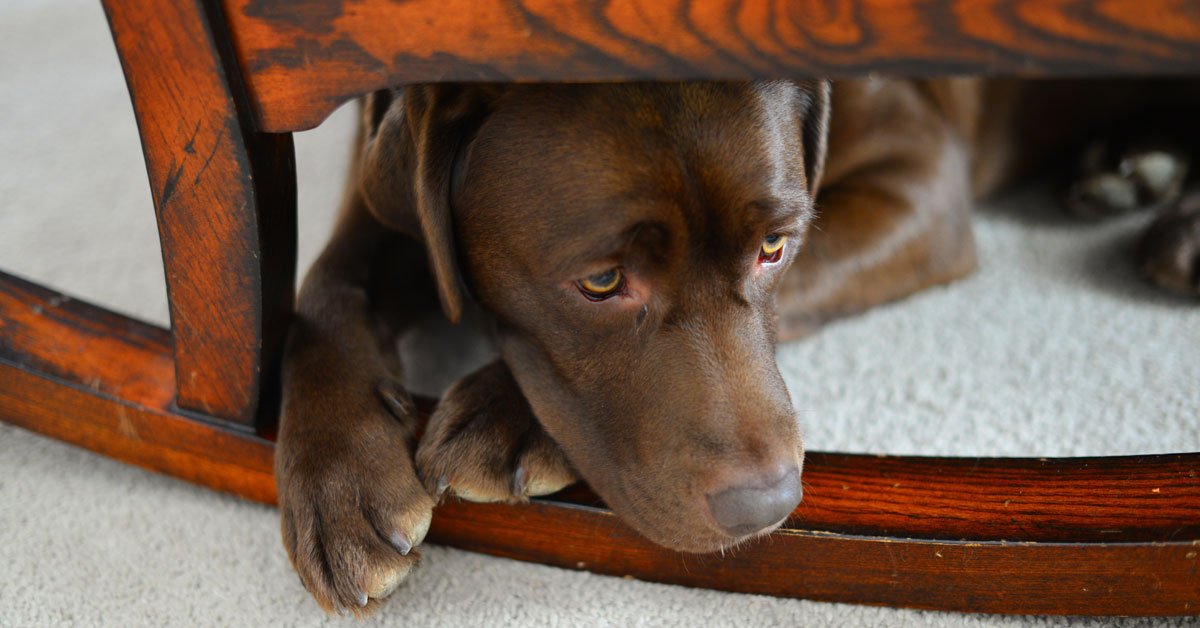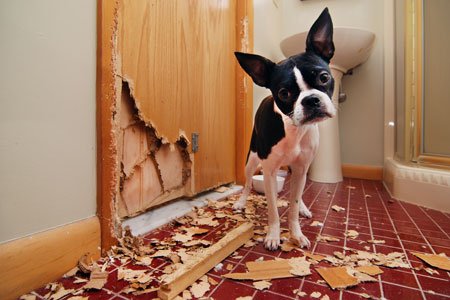Does Your Dog Have Separation Anxiety?
It’s normal for a new pet or a puppy to have some anxiety when left alone in a new home or at a dog daycare for the first time. If you recently adopted a dog or got a puppy, you should expect there to be some disruptive behavior for a short period. However, if your dog is older or if you’ve had your puppy for a while now, and they are still destructive, it might be a sign that they are experiencing separation anxiety.
What Causes Separation Anxiety in Dogs?
Separation anxiety occurs when a dog has bonded or becomes very attached to a person and experiences a stress response when that person is gone from the home or leaves the dog at daycare or boarding. It is not entirely known why some dogs experience separation anxiety. Some evidence supports that there may be breeds that are more prone to it. It is also common in shelter dogs or animals that were abandoned.
Sudden changes in schedules or environments have also been found to cause dogs to develop anxiety. For example, if you were previously able to spend a lot of time at home with the dog and now you have a busier work schedule, or if you moved to a new home, or have been taking the dog to daycare. A loss of a family member or even a divorce can have adverse effects on a pet as well.
Symptoms of Separation Anxiety in Dogs
There are several signs to look out for that indicate your dog may be experiencing separation anxiety. However, some of these behaviors can be signs of other issues as well. If you are unsure if your dog is unwell, or if they are just anxious, take them to the vet. Your vet can evaluate your dog’s behavior to help you determine whether it is anxiety or a sign of something else. A good indicator that it is, in fact, anxiety, is if the following behaviors occur consistently every time you leave or as you are preparing to leave.
Excessive Barking, Howling, or Whining
All dogs tend to bark or whine occasionally. If the whining, barking, or howling is persistent, however, and only occurs in excess when you are gone, then they are likely stressed and experiencing separation anxiety.
Urinating and Defecating in the House
Accidents in the home can occur even with house-trained dogs. Maybe they were left inside longer than usual, or they could have an upset stomach or be experiencing a urinary tract infection. If accidents frequently happen whenever you leave, though, it is probably anxiety.
Panting and Drooling in Excess
When a dog is hot, or if their heart rate is elevated from exercise or excitement, they pant and drool more than usual. This may also occur if they aren’t feeling well. However, if there is excessive panting and drooling only when you leave the home or when they are left at doggy daycare, it’s a sign that they are experiencing anxiety.
Persistent Pacing or Shaking
If you notice your dog pacing at the door or window when you get home, this could be a sign that they are excited to see you. If they are experiencing separation anxiety, the pacing will likely only occur in excess when you are gone or leaving. Similarly, some shaking when an owner returns may be a sign of pent up energy, but if the shaking occurs when you are gone or preparing to leave, it is a good indicator that they are feeling anxious.
Chewing, Digging, and Other Destructive Behaviors
Puppies and other untrained dogs may be prone to chewing when they haven’t been taught otherwise. If your dog is trained and they are still destructive when you leave home, this is a sign that they are feeling anxious. Some dogs will even chew on themselves when they are anxious and have pent up energy.
Trying to Escape
Some dogs will attempt to escape from a room or a cage when they are feeling cooped up and confined. However, if you are noticing that your dog only tries to do this when you aren’t home, it could be because they are experiencing separation anxiety and are attempting to escape to look for you.
How to Treat Separation Anxiety
The first thing to remember when you are working with a dog with separation anxiety is to have patience. As frustrating as it might be, just remember this is happening because they love you and don’t like being away from you. Depending on their age and how long they have had the anxiety, it may take a while before you can undo these behaviors.
- Condition them to see being left alone as a reward. Give your dog a special treat or toy that is only for when you are gone, like a Kong toy stuffed with peanut butter.
- Don’t make a big deal when you leave or come home. Getting overly excited when you come home to your dog, or sad when you leave them, only validates that what they are feeling is okay. As hard as it might be, try not to give them attention right when you walk in the door. Give them a few minutes, and then calmly pet them.
- Exercise. This should be done for most dogs, but dogs with anxiety could especially benefit from a little extra exercise. If your dog is tired and has had time to play with you, this might help them feel more relaxed when you leave.
- Leave something behind that smells like you. Leaving a basket of dirty laundry nearby will help calm your dog by allowing them to smell your scent even though you are gone. This can also work with just one or two recently worn items if you don’t want to leave out a basket full of dirty clothes.
- Consider natural or homeopathic remedies. There are some supplements that can help naturally ease your dog’s anxiety. You should always check with your vet first, however, to ensure that the product is safe to use.
- Medication. If your dog is extremely anxious and nothing else is working, your vet may be able to prescribe a medication that can help keep them calm while you are gone.
How Safe Journey Dog Boarding Can Help
At Safe Journey Dog Boarding, we have helped dozens of dogs successfully overcome anxiety. We understand that each dog has its own unique behaviors. Our staff will work with your dog in a calm environment to build trust and give them lots of love and social interaction. This kind of thing can take time and patience, but we are dedicated to working with your dog to build trust and ensure their happiness and well being.


